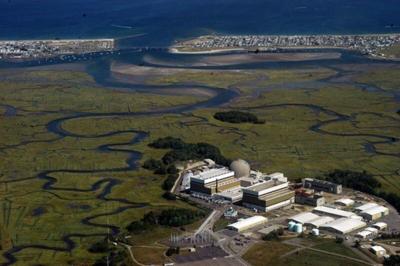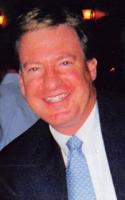SEABROOK, N.H. — The Nuclear Regulatory Commission's Atomic Safety and Licensing Board has accepted the Seabrook nuclear plant's concrete monitoring program after several months of deadline extensions.
The licensing board made its ruling on Friday, Aug. 21, and is treating it as non-public to allow the parties an opportunity to review it and propose any redactions. A public version of the ruling, which was nearly 200 pages long, will be issued by Sept. 11.
The board's decision was originally supposed to be issued within 90 days of a Sept. 24, 2019, hearing in Newburyport about concrete degradation at the Seabrook power plant, but was extended multiple times. The plant sits about 17 miles northwest — as the seagull flies — from parts of Gloucester and Rockport, Massachusetts.
During the hearing, Amesbury non-profit C-10 called for the revocation of the plant's license renewal.
Concrete degradation was discovered at the plant in 2010. It results from an alkali-silica reaction, or ASR, a chemical process that causes small cracks.
In a press release from C-10, Natlie Hildt-Treat, the organization's executive director, said that while the board accepted NextEra's concrete testing program, it did so with "several important conditions that will ensure the health and safety of the public."
“NextEra Energy Seabrook has been sent back to the drawing board with this extremely detailed ruling,” said Treat in the release.
According to the release from C-10, the Atomic Safety and Licensing Board's order directs Seabrook Station to "conduct much more frequent and detailed monitoring and engineering evaluations in a number of situations, in some cases increasing the frequency of testing from the proposed five to ten years, up to six-month intervals. It also orders NextEra to conduct a petrographic analysis on each core sample extracted from the plant’s concrete in order to detect internal microcracking and delamination. This technique was urged by C-10’s expert witness, Dr. Victor Saouma, who is one of the world’s leading authorities on the condition of alkali-silica reaction, or 'ASR.'"
“I am extremely proud of what C-10 has accomplished with this case,” said Treat in the release. “We have markedly moved the needle by ensuring that better science underpins Seabrook’s concrete aging management plan. C-10’s work and the body of knowledge we have brought to light will no doubt influence how future ASR policy is made in this country."
Treat added that she hopes NextEra "begins taking steps to strengthen Seabrook's concrete aging management plan right away."
“They won on the point that their License Amendment Request was upheld," said Treat. "C-10 and public safety won in that more frequent and more revealing testing and monitoring of the plant's concrete were ordered by the Board.”
C-10 monitors plant safety because six Massachusetts communities — Amesbury, Merrimac, Salisbury, Newburyport, Newbury and West Newbury — are within a 10-mile radius of the plant and are considered part of the Seabrook Station emergency planning zone.
In a statement given via email on Monday, Peter Robbins, director of nuclear communications for NextEra, said the company ispleased that the Atomic Safety and Licensing Board ruled in favor of Seabrook, calling its concrete monitoring and management programs "comprehensive and effective."
"Nothing is more important than the safety of employees and the public, and our robust ASR program is part of that commitment to safety," said Robbins in the statement. "Public dialogue is an ongoing component of the NRC’s regulatory process, and we appreciate having had the opportunity to share the scientific basis of our testing and monitoring programs with the ASLB."
Robbins said NextEra will continue to review the board's decision and will determine its next steps.
Christopher Nord, a C-10 board member who helped lead the challenge to Seabrook’s License Amendment Request relative to the plant’s degraded concrete, added that C-10 "shall weigh our legal options from here," noting that the parties have 25 days from the ruling to submit a petition for commission review.
“This is a case that should not have been necessary, because the Nuclear Regulatory Commission, as well as NextEra Energy, already had in their possession most of the information on which C-10’s intervention was based. Our expert witness, Dr. Victor Saouma, had been commissioned by the NRC to conduct a study of the ASR problem at Seabrook,” said Nord, adding that C-10 will "weigh our legal options from here."
Jack Shea may be contacted at 978-961-3154 or jshea@gloucestertimes.com. Follow him on Twitter @iamjackshea.














